Saturday, September 10, 2005
Wife Peggy and I were watching Fox News, when she began urging me to go help with the Katrina disaster relief effort: I’ve never done it before; it’s the biggest effort ever; it will be good experience; etc. I encouraged her to think that this idea is hers, as I wasn't sure how she would take it if I proposed going.
Sunday, September 4: Davis
Used my Delta Skymiles to get a ticket to Jackson, Mississippi, and priceline.com to get a hotel and rental car. Peggy had second thoughts, as usual; as usual, I didn't. Slight complication: our son John was leaving Sept. 7 for Afghanistan, and I knew that Peggy was more worried than she was letting on.
Monday, September 5: Delta to Atlanta, then to Jackson.
I fell into bad company immediately: a nurse, Kathleen Leatherbarrow, from Modesto on her way with her husband and six other nurses to Jackson, MS, under the auspices of the Red Cross. She was very excited—‘just had to come’. Their plan is to travel to Baton Rouge, presumable to work in one of the three large refugee centers set up there. It was not clear to Kathleen that she would actually be able to do nursing work, but she was willing to go anyway. In Atlanta we changed planes for Jackson. This time I sat next to a quiet middle-aged man who thanked me for coming to help. I noticed that he was doing a Bible study but didn’t ask about it. After we picked up our baggage Bob Smith, my seatmate, gave me his card and told me I should feel free to call him if I needed anything while in Jackson. Very friendly—and as it has turned out, very typical.
I went to the Alamo rental desk. There were only five cars left; the only mid-size a Sebring convertible. I commented that it seemed a little strange to be coming to help with disaster relief and be driving around in a convertible. The agent rented me a Chevy Equinox quasi-SUV instead; a little more but worth avoiding the grief of explaining.
One little problem—I had heard that there was no gasoline in Jackson. The SUV came with 1/8 tank of gas. Another friendly lady at baggage claim told me where to look for gas on the way into town from the airport. I tried her way, which did indeed have lots of gas stations; unfortunately, not one had gas. Instead, there were bags over the pump nozzles, or yellow ‘caution’ tape around the pumps. No luck tonight. Slept well at thee Marriott Downtown Jackson, assuming it would be my last comfortable bed for a while. Wrong. The tub, however, was the last I would see for a while. Hot water was goooooood!
Tuesday, September 6: Jackson to Biloxi
Between Monday afternoon and Tuesday morning I contacted by fax, phone, or e-mail about 10-12 places listed on the internet as places seeking physician volunteers in Louisiana or Mississippi. As of noon on Tuesday I hadn’t heard from any of them. So I went out to get gas—this time, available with only a short wait. Surprisingly, given the severe shortage of gas, prices were only about $2.50 a gallon. A little ‘price-gouging’ would have shortened the lines considerably!
Out shopping for some things to keep my cell phone working, I saw a convoy of Salvation Army disaster relief trucks heading south on Highway 49—probably toward Biloxi, I thought. I missed following them then, but decided to head that way anyway—they seemed to know where the action was. With my new gadgets from Radio Shack, I grabbed a Subway sandwich and started down Highway 49 where the Salvation Army trucks had gone. I had no real idea where I was going to end up.
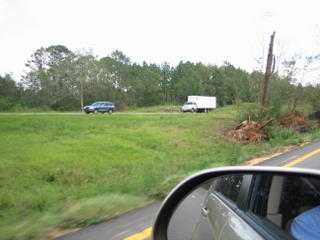 North of Hattiesburg, I started seeing trees blown over in the median. Like Virginia and perhaps elsewhere in the South, highways such as this are built with a wide median planted with trees. The trees, quite large hardwoods, were all blown down in the same direction, with the trunks pointed southeast by south. Katrina, her leading winds traveling counterclockwise, had hit from northwest to southeast, knocking all the trees down in the same direction.
North of Hattiesburg, I started seeing trees blown over in the median. Like Virginia and perhaps elsewhere in the South, highways such as this are built with a wide median planted with trees. The trees, quite large hardwoods, were all blown down in the same direction, with the trunks pointed southeast by south. Katrina, her leading winds traveling counterclockwise, had hit from northwest to southeast, knocking all the trees down in the same direction.Just before Hattiesburg—there was one of those Salvation Army trucks. I passed it, doubled back, and stopped behind it. No problem, just waiting for the other truck. This was the last of the convoy I had seen earlier, I guess. They were from—of all places—New York City! ‘If you don’t mind’ I said, ‘how about if I follow you?’
‘Fine,’ was the reply. So now I had a new destination; Biloxi (pronounced here ‘Biluxi’), east of Gulfport.
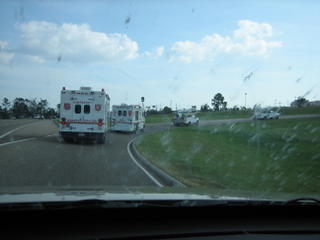 So I followed the two trucks on southeast to Gulfport, then east on I-10 to Biloxi. Arriving in Biloxi, we passed over a bridge with a sign warning that only residents and disaster relief employees were allowed in the area. As I followed the Salvation Army trucks through this part of town, two things were obvious: (1) this section was not in great shape to begin with; and (2) it was really hard hit by the hurricane. Stores and offices—all closed.
So I followed the two trucks on southeast to Gulfport, then east on I-10 to Biloxi. Arriving in Biloxi, we passed over a bridge with a sign warning that only residents and disaster relief employees were allowed in the area. As I followed the Salvation Army trucks through this part of town, two things were obvious: (1) this section was not in great shape to begin with; and (2) it was really hard hit by the hurricane. Stores and offices—all closed. Many, many buildings knocked down in heaps; no electric power; debris strewn everywhere. And here and there a rather large boat that was sitting where no boat was supposed to be sitting—at the side of a road, next to a house.
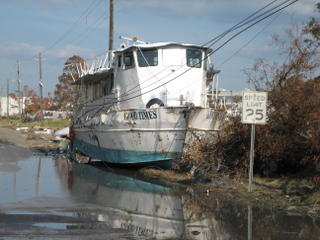 Now we arrived at the Salvation Army distribution center, with three or four big trailers. I was directed to the fire department, back beyond where we had turned to come into this part of town. I went back, but passed Division Road where I was supposed to turn and instead continued down two more blocks, arriving at the water. This was the Gulf. I turned and drove along the shoreline road.
Now we arrived at the Salvation Army distribution center, with three or four big trailers. I was directed to the fire department, back beyond where we had turned to come into this part of town. I went back, but passed Division Road where I was supposed to turn and instead continued down two more blocks, arriving at the water. This was the Gulf. I turned and drove along the shoreline road. 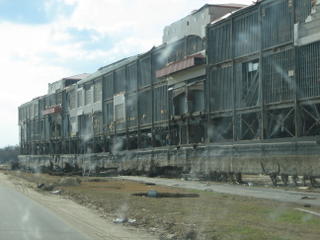 Passing a large, modern building, it seemed to have suffered severe damage, whereas other modern buildings near it had not.
Passing a large, modern building, it seemed to have suffered severe damage, whereas other modern buildings near it had not.  As I passed by it, I realized why: this was a floating casino, essentially a gigantic houseboat. It had been lifted up on the flood surge of the hurricane and carried across the road! A little farther on, I found yet another beached (previously)-floating casino. This one had apparently collided with a hotel building, and the front corner of the hotel (I later learned this was the old Tivoli) was sheared off.
As I passed by it, I realized why: this was a floating casino, essentially a gigantic houseboat. It had been lifted up on the flood surge of the hurricane and carried across the road! A little farther on, I found yet another beached (previously)-floating casino. This one had apparently collided with a hotel building, and the front corner of the hotel (I later learned this was the old Tivoli) was sheared off.
I managed to make my way back to the fire department, but no one there knew anything about any health services, except for a tent put up behind the fire department for minor urgent care. I asked, ‘Is there a hospital operating around here?’
‘There’s the Regional Medical Center down the road’ said a policeman. ‘You might try there’.
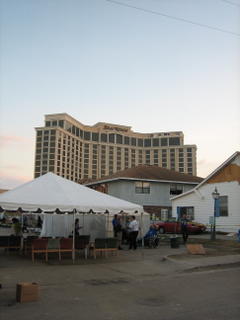 I did. This was just down the road, near a remaining (non-floating) casino which showed little damage, called the Beau Rivage. I had to laugh; earlier I passed and photographed a run-down place with a hand-written sign: “No Rivage” and below that “Heartbreak Hotel”.
I did. This was just down the road, near a remaining (non-floating) casino which showed little damage, called the Beau Rivage. I had to laugh; earlier I passed and photographed a run-down place with a hand-written sign: “No Rivage” and below that “Heartbreak Hotel”. The hospital, Biloxi Regional Medical Center, looked completely intact. I pulled into the parking lot; on the other side of the street from the ED entrance were two tents, apparently for emergency purposes. Walking into the ED, I asked the first person I saw if they could use a volunteer physician. This first person just happened to be a nurse responsible for ‘staff development’. She dropped what she was doing, and took me to the administration office. There I met Tim. Now Tim today was well tanned, a little scruffy, wearing a baseball cap, T-shirt and jeans. Tim, however, is the hospital CEO. I learned later from a nurse that until Katrina, he was seen ONLY in a suit. Interviewed on TV, he had been asked about the ‘rather casual’ appearance of the nursing staff, who were wearing cut-off scrubs and flip-flops when the air conditioning was off. His reply: ‘Tomorrow, the nurses are wearing bathing suits, and I’m going to be buck naked.” This, needless to say, endeared him to the nursing staff.
 Back to my meeting with Tim: I told him my name and that I was a cardiologist from California and would like to be helpful. I handed him my envelope with my CV and copies of my diplomas, certificates, and license; then my driver’s license (photo ID) and physician license wallet card. Tim told me that because there had been an emergency declaration, this was all I needed—‘Welcome aboard!’ Wow, that was fast!!
Back to my meeting with Tim: I told him my name and that I was a cardiologist from California and would like to be helpful. I handed him my envelope with my CV and copies of my diplomas, certificates, and license; then my driver’s license (photo ID) and physician license wallet card. Tim told me that because there had been an emergency declaration, this was all I needed—‘Welcome aboard!’ Wow, that was fast!! Tim took me to the ED where Cindy, a hospital administrator, got me a room in the hospital and Paul Medina, an ED physician just coming back to work for the night shift, gave me a quick tour. The tour was mostly of the two tents I had seen across from the ED entrance: these were in fact triage and treatment areas. They had lots of supplies: bandages, pain relievers, and most of the most likely medications anyone would need. These were given without charge to patients seen in the tent. Many had lost their medications, or could not find an open pharmacy. Others had new problems needing treatment. Private physician offices and other clinics were closed, so this was the only medical care available for the local community; this community, by the way, appears quite low income, and mixed race.
This ‘ED Annex’ tent treated several hundred patients a day, with minimal paperwork, no charge for drugs, and vastly more efficient than the usual ED—because we don’t have to worry about the usual defensive medicine/liability issue.
Wednesday, September 7: Biloxi Regional Medical Center
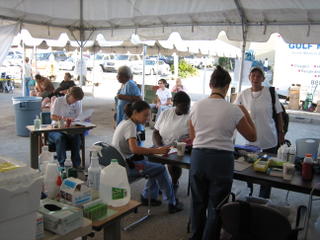 It's just after midnight. I started this a.m. at 7, working in the tent outside the hospital, doing small urgent care stuff: refilling lost medications, treating rashes mostly. In the afternoon it got up to 92, and felt pretty hot in the tent (actually a canopy; when a breeze came up we could feel it). Every patient expressed gratitude for help from the hospital staff and the volunteers who had come from as far away as Davis/Redwood City, California.
It's just after midnight. I started this a.m. at 7, working in the tent outside the hospital, doing small urgent care stuff: refilling lost medications, treating rashes mostly. In the afternoon it got up to 92, and felt pretty hot in the tent (actually a canopy; when a breeze came up we could feel it). Every patient expressed gratitude for help from the hospital staff and the volunteers who had come from as far away as Davis/Redwood City, California. Lots of people having big anxiety and grieving problems. Even if their own houses were spared, their neighbor's, or close family members' houses were destroyed. One poor fellow with chronic back pain from a ruptured disk was tortured that his re-injuring it would keep him from helping clean up and provide for his family. I did well enough at the stuff in the 'tent' that they want me back tomorrow, and as long as I choose to stay on and there’s still business.
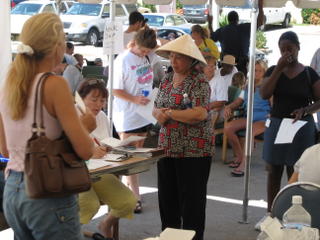
I left work at 7 pm, spent the next couple of hours chatting with people. Most memorable: the nurses sharing with me their own feelings of loss for the Biloxi they had known since childhood: the special oak tree with a ring in the trunk; the Tivoli hotel that was just being remodeled after years of neglect when it was hit by a floating casino and the corner knocked off. Now it's coming down. Beauvoir, Jefferson Davis' home, is gone. So many memories of childhood, gone. I was about to turn in about 11:00 when I went downstairs for a midnight snack of crackers and peanut butter (I'm NOT going to lose weight here!). Stepped outside: the growing odor of decaying flesh—of some sort –is becoming more prominent. We imagine that it’s the unburied bodies of some unfortunate souls, but it may just be some shrimp piled up somewhere, or somebody’s powerless freezer filled with previously frozen meat. Inside the hospital, air filters are working to keep the odor down.
An ambulance pulled up; an ER physician went to the ambulance, and said something like "Aha! sounds cardiac to me!"--a patient with an implanted defibrillator that had shocked him 15 or 20 times for ventricular tachycardia. The device was working fine, he wasn't. Another storm victim who hadn't been eating or drinking normally. We brought him insid; I took care of him (Yeah! a cardiac case! anything but another rash!) by giving him intravenous magnesium and amiodarone. After this treatment he seems to be settling down, and is being admitted. Tomorrow he will probably need to be shipped out to Mobile, which has more facilities than this small (but critically situated) community hospital.
By the way: I made the mistake of telling the patient, in response to his 'silly question'--"Where am I"--he was in BiLOXi Regional Medical Center. Seeing the horrified looks, I immediately apologized: "Sorry, "BiLUXi Regional Medical Center". The only benefit so far of Katrina is that the rest of the country knows how Mississippians pronounce Biloxi. I'm having a great time. Feel really blessed to be here. I'm turning in now. 'Night.